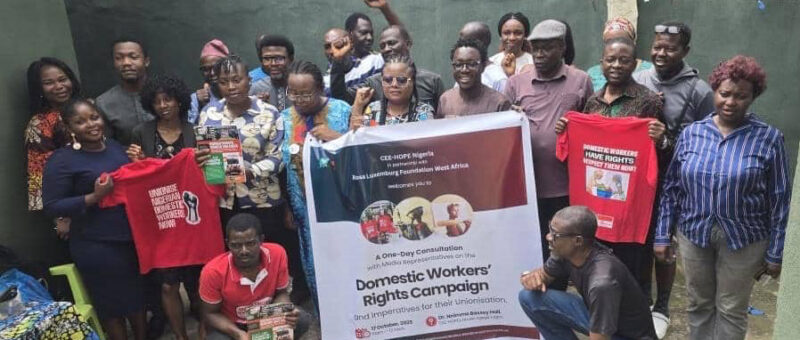1
…As CEE-HOPE Pushes For Unionization, Legal Protection Of Workers
LAGOS – As the world advances, rights remain a central conversation across borders. In Nigeria, Domestic workers are invisible. Despite various protests, media reportage, and harrowing tales of maltreatment, the Rights of Domestic workers in Nigeria continued to be trampled upon.
Domestic workers in Nigeria form an indispensable workforce running the daily activities of many Nigeria homes. They are the invisible systems that manage cleaning, cooking, caring for the children, attending to the elderly, the gardeners, the street hawkers, and a lot more. Yet, despite their indispensable role, they remain among the most unprotected and undervalued members of Nigerian society.
An estimated four million domestic workers in Nigeria continue to live and work under uncertain, and underpaid, conditions. Often times, they are exploited and molested. Nigeria has also failed to ratify key international standards, such as the ILO Convention 189 on Decent Work for Domestic Workers (2011)—which sets out minimum protections, including rights to fair wages, rest hours, paid leave, freedom of association, and protection from abuse.
Children in Domestic Work: A Darker Terrain
Equally troubling is the widespread use of underage househelps. In many cases, parents from rural areas, battered by poverty, hand over their children as parcels, some as young as three years old, for as little as ₦3,000 to ₦5,000 a month. These children are often denied education and terribly exposed to physical and sexual abuse.
Although legal frameworks such as the Child Rights Act exist, enforcement remains weak and inconsistent across states. Even where laws have been domesticated, implementation is almost non-existent.
Voices for Change

In an interview with Saturday Independent, Betty Abah, Executive Director of CEE-HOPE Nigeria shared insights on the plight of domestic workers in Nigeria. She stressed that the most sustainable solution lies in unionization.
“We’ve been pushing this campaign since 2020. The kind of experiences domestic workers go through are too dehumanizing and horrific to be ignored. There are organised bodies for domestic workers in other countries, we need the same here. There’s also an urgent need for effective legislation,” she said.
Abah recalled that while there was once a Senate public hearing on a proposed bill to protect domestic workers, it was marred by a lack of seriousness from lawmakers.
“We hope this proposed bill doesn’t come out half-baked,” she added.
Similarly, Ngozi Okoro, a child rights advocate, decried the “compassion fatigue” among enforcement agencies.
“NAPTIP, like many other agencies, seems overwhelmed. They’ve seen so many cases that they’ve grown numb. Unfortunately, that means many incidents go unreported or are left unattended,” she said.
The Need for Data and Structure
Hassan Taiwo Soweto, National Coordinator of the Education Rights Campaign (ERC), emphasized the absence of reliable data on domestic workers’ conditions.
“There’s a huge data gap on cases of maltreatment. Beyond data, we need to structure and professionalize domestic work. Ironically, some of the same people mistreating domestic workers today once worked as domestic staff abroad. It’s time the government recognized this workforce and ratified the ILO convention.”








